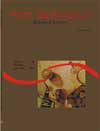<b>Rats muscle-tendon interface induced to alcoholic ingestion</b> - DOI: 10.4025/actascibiolsci.v26i3.1601
Abstract
The intake of big amounts of ethylic alcohol can affect many different systems of the human body. In the muscles, alcohol can cause early atrophy, degeneration and motor deficit of muscle fibers, which can cause fiber’s necrosis. In this study we aim at analyzing the influence of ethylic alcohol on the muscle – tendon interface. For it, 12 wistar rats were used (Rattus norvegicus). They were divided in two groups: A (control), treated with potable water and commercial ration and group B (experimental), they received sugar-cane brandy diluted in 30ºG.L. and commercial ration, during 100 days. After sacrifice, the flexor muscles of right anterior paws were collected. They were fixed in Bowin solution for 48 hours and the routines of histological technique was performed for the inclusion in paraffin. As noticed in the methodology used, histological alterations, occurred, such as accumulation of adipose tissue in the interface muscle-tendon region and muscular fiber loss of organization in experimental animals. We can infer that, in the dosage used, the ethylic alcohol causes histological alterations in muscle-tendon interfaceDownloads
Download data is not yet available.
Published
2008-04-01
How to Cite
Pereira, K. F., & Conegero, C. I. (2008). <b>Rats muscle-tendon interface induced to alcoholic ingestion</b> - DOI: 10.4025/actascibiolsci.v26i3.1601. Acta Scientiarum. Biological Sciences, 26(3), 361-364. https://doi.org/10.4025/actascibiolsci.v26i3.1601
Issue
Section
Biology Sciences
DECLARATION OF ORIGINALITY AND COPYRIGHTS
I Declare that current article is original and has not been submitted for publication, in part or in whole, to any other national or international journal.
The copyrights belong exclusively to the authors. Published content is licensed under Creative Commons Attribution 4.0 (CC BY 4.0) guidelines, which allows sharing (copy and distribution of the material in any medium or format) and adaptation (remix, transform, and build upon the material) for any purpose, even commercially, under the terms of attribution.
Read this link for further information on how to use CC BY 4.0 properly.
0.6
2019CiteScore
31st percentile
Powered by 

0.6
2019CiteScore
31st percentile
Powered by 











1.png)




3.png)













